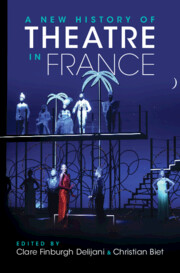Book contents
- A New History of Theatre in France
- A New History of Theatre in France
- Copyright page
- Dedication
- Contents
- Illustrations
- Contributors
- Acknowledgements
- Notes on the Text
- Introduction
- Chapter 1 The Performing Arts in Fifteenth- and Sixteenth-Century France
- Chapter 2 Drama during the Wars of Religion
- Chapter 3 Drama before Standardization
- Chapter 4 Neo-Classical Tragedy
- Chapter 5 Molière, a Man of the Stage?
- Chapter 6 Theatres as Economic Concerns
- Chapter 7 Seventeenth-Century Printed Theatre
- Chapter 8 Non-Official Eighteenth-Century Stages
- Chapter 9 The Expanded Theatre of the French Revolution
- Chapter 10 Nineteenth-Century Melodrama, Vaudeville and Entertainment
- Chapter 11 New Approaches to Women Actors and Celebrity in Nineteenth-Century France
- Chapter 12 Extended Romanticism in the Extended Nineteenth Century
- Chapter 13 Poetry in Action, 1945–1968
- Chapter 14 Performance and Installation Art
- Chapter 15 Twentieth- and Twenty-First-Century Theatre Directing
- Chapter 16 Political Theatre in France (1954–2020)
- Chapter 17 Liberating Third World Theatre
- Chapter 18 Francophone Theatre-Makers in France
- Chapter 19 Migration in Modern and Contemporary Playwriting
- Chapter 20 An Interview with Éric Ruf
- Chapter 21 An Interview with Magali Mougel
- Chapter 22 An Interview with Phia Ménard
- Bibliography
- Index
- References
Chapter 12 - Extended Romanticism in the Extended Nineteenth Century
Published online by Cambridge University Press: 22 October 2024
- A New History of Theatre in France
- A New History of Theatre in France
- Copyright page
- Dedication
- Contents
- Illustrations
- Contributors
- Acknowledgements
- Notes on the Text
- Introduction
- Chapter 1 The Performing Arts in Fifteenth- and Sixteenth-Century France
- Chapter 2 Drama during the Wars of Religion
- Chapter 3 Drama before Standardization
- Chapter 4 Neo-Classical Tragedy
- Chapter 5 Molière, a Man of the Stage?
- Chapter 6 Theatres as Economic Concerns
- Chapter 7 Seventeenth-Century Printed Theatre
- Chapter 8 Non-Official Eighteenth-Century Stages
- Chapter 9 The Expanded Theatre of the French Revolution
- Chapter 10 Nineteenth-Century Melodrama, Vaudeville and Entertainment
- Chapter 11 New Approaches to Women Actors and Celebrity in Nineteenth-Century France
- Chapter 12 Extended Romanticism in the Extended Nineteenth Century
- Chapter 13 Poetry in Action, 1945–1968
- Chapter 14 Performance and Installation Art
- Chapter 15 Twentieth- and Twenty-First-Century Theatre Directing
- Chapter 16 Political Theatre in France (1954–2020)
- Chapter 17 Liberating Third World Theatre
- Chapter 18 Francophone Theatre-Makers in France
- Chapter 19 Migration in Modern and Contemporary Playwriting
- Chapter 20 An Interview with Éric Ruf
- Chapter 21 An Interview with Magali Mougel
- Chapter 22 An Interview with Phia Ménard
- Bibliography
- Index
- References
Summary
Florence Naugrette examines the genesis and legacy of the nineteenth century’s most celebrated movement, romanticism. Whereas romanticism is often susceptible to being cast at the opposite end of the spectrum to classicism, Naugrette argues that it took its cues from wherever it could find them: the noble classical and neoclassical genres of tragedy and comedy; opera and comic opera; the Elizabethans; bourgeois drama; and popular genres including pantomime, féerie and above all melodrama. Romantic theatre thus appeared in all registers from comic to tragic, realist to fantastical. Naugrette also dispels the myth that Victor Hugo and his best known contemporaries Dumas, Vigny and Musset, all consecrated by posterity, were romantic theatre’s sole figureheads. She affords due credit to a host of other playwrights who contributed to the movement, notably women such as George Sand, Virginie Ancelot and Delphine de Girardin; and offers visibility to the actors and actresses who contributed to the success of the romantic theatre not only by playing its characters but also by inspiring playwrights and inventing new acting methods. Naugrette concludes by positing that French romanticism, originating predominantly in the French Revolution’s ethos of democratization, was also a nascent form of national popular theatre.
Keywords
- Type
- Chapter
- Information
- A New History of Theatre in France , pp. 243 - 257Publisher: Cambridge University PressPrint publication year: 2024

